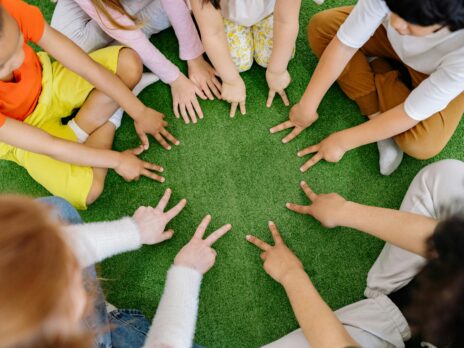
Here they come: a cross-section of the young in trackies and crop tops or sarcastic slogan tees, fresh-faced with scattered freckles and acne, or made up with thick eyeliner and dark, moth-like fake lashes. Depressed, hyperactive, in love, against it, serious and often very silly, here are all the forms of girl (and those questioning whether they want to be known by that term at all) I remember from my own early teens, now sloping into a large barn at the base of a valley in Devon, to answer my questions about love.
For the last four summers I have taught on this residential creative writing week at an Arvon writing house with a cohort of Year 7s, 8s and 9s from a nearby state school. The activity weeks are their end-of-term treat. “The cool kids do surf camp and the weird ones come here,” they tell me, which you can translate to mean we get the best of the bunch: the diary-keepers and the poets, those governed by electrical storms and pyrotechnic shows of feeling. The crème de la crème, as Jean Brodie would have put it.
When I’m teaching I often think of Muriel Spark’s extraordinary novel The Prime of Miss Jean Brodie, about an unconventional Edinburgh teacher and the set of girls she attempts to model from childhood to adolescence. Spark describes what each member of the “Brodie set” will become “famous for” at secondary school, be it sex or mathematics. The kids I meet in Devon have an equally fine-tuned understanding of social dynamics – where they sit in the pecking order and what they are “famous” for. It’s staggering how much more open they are about sexuality than previous generations. The cooler you are, the less you experience homophobia around coming out, they say, explaining that, “In rural areas, people just aren’t exposed to that much diversity.”
I especially wanted to hear their thoughts on romantic love, as there is all this pre-run wisdom and oracular capacity in young people, as if those experiences already lie dormant within them. (This is how it feels in The Prime of Miss Jean Brodie, too; Spark defies chronology to leap ahead and describe what will become of the Brodie set in adulthood, as if such events are encoded into their DNA.) So for an hour, I sat with 12 of them on sofas in the barn while they described all they know and anticipate about the matters of love.
What is love?
– Love is like a fish.
A fish?!
– As there are all kinds of fish, from goldfish to sharks, there’s also all kinds of love.
– It’s like friendship, but you can be more vulnerable with a person you love.
– And there’s some things you can’t do with your friends! [All cackle.]– But your love shouldn’t all be for one person. That’s not how it’s meant to work.
Why do we want to fall in love? And does it change us?
– I want someone to love so I don’t feel lonely. It makes you happier. Even having a crush makes me feel happier for a bit.
– I mean, I’m a teenager, so I probably haven’t got everything figured out yet, but I’m asexual and I think people falling in love is silly because you can’t trust love.
– Like in Romeo and Juliet. We’re reading it at school and they fall in love immediately and get married the next day! Then they die.
– Exactly: silly.
Are teenagers or adults better at loving relationships?
– Both are equally bad at it. Adults can’t express their feelings and teenagers are awkward.
– I think adults have more issues to work around in love. People have this perception about love being perfect, but you forget everyone has issues.
– Some adults shouldn’t even be adults.
– Yes, some of them can’t even do their taxes.
Are your parents your role models for love?
– Definitely not!
– Some married people might not be in love any more, and that’s fine, but it affects the children.
– Having divorced parents makes you more aware that love might not always be there. But you can still be friends and not bitter, like my parents.
– Ooh a butterfly! [Everyone is momentarily distracted by a butterfly that flies in, then disappears up into the rafters.]– My parents aren’t together and they don’t get on. People always give that stereotype: “You’re going to end up like your dad.” But I’m really not. He says, “What I’ve done is all for love,” and I’ve learned not to trust that.
How do you do love well?
– Don’t try to solve all their problems.
– Communicate.
– Don’t confuse love with wanting to be them. Sometimes I see a girl with cool eyeliner, and I think I love her, but actually maybe I just want her eyeliner.
– I’m autistic so maybe this is specific to me, but if you feel you can mask less with someone, then you should be with them.
Can love change the world?
– Yes, if all the world leaders became gay and kissed. If they actually loved each other, then there wouldn’t be war or homophobia.
– But everyone already has love and they’re still bad to other people and actually they often don’t know how to love themselves.
– When the power of love overtakes the love of power, the world will be at peace. [Communal “Woaaaah!”]– I can’t take credit. It’s Jimi Hendrix.
[See also: Samuel Pepys’s diary of a somebody]
This article appears in the 16 Jul 2025 issue of the New Statesman, A Question of Intent





